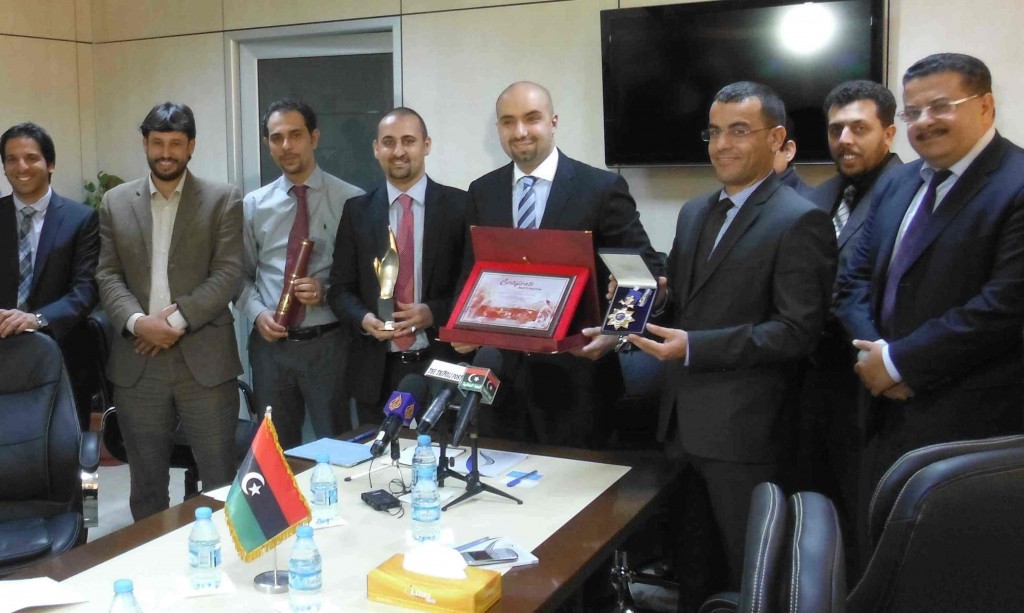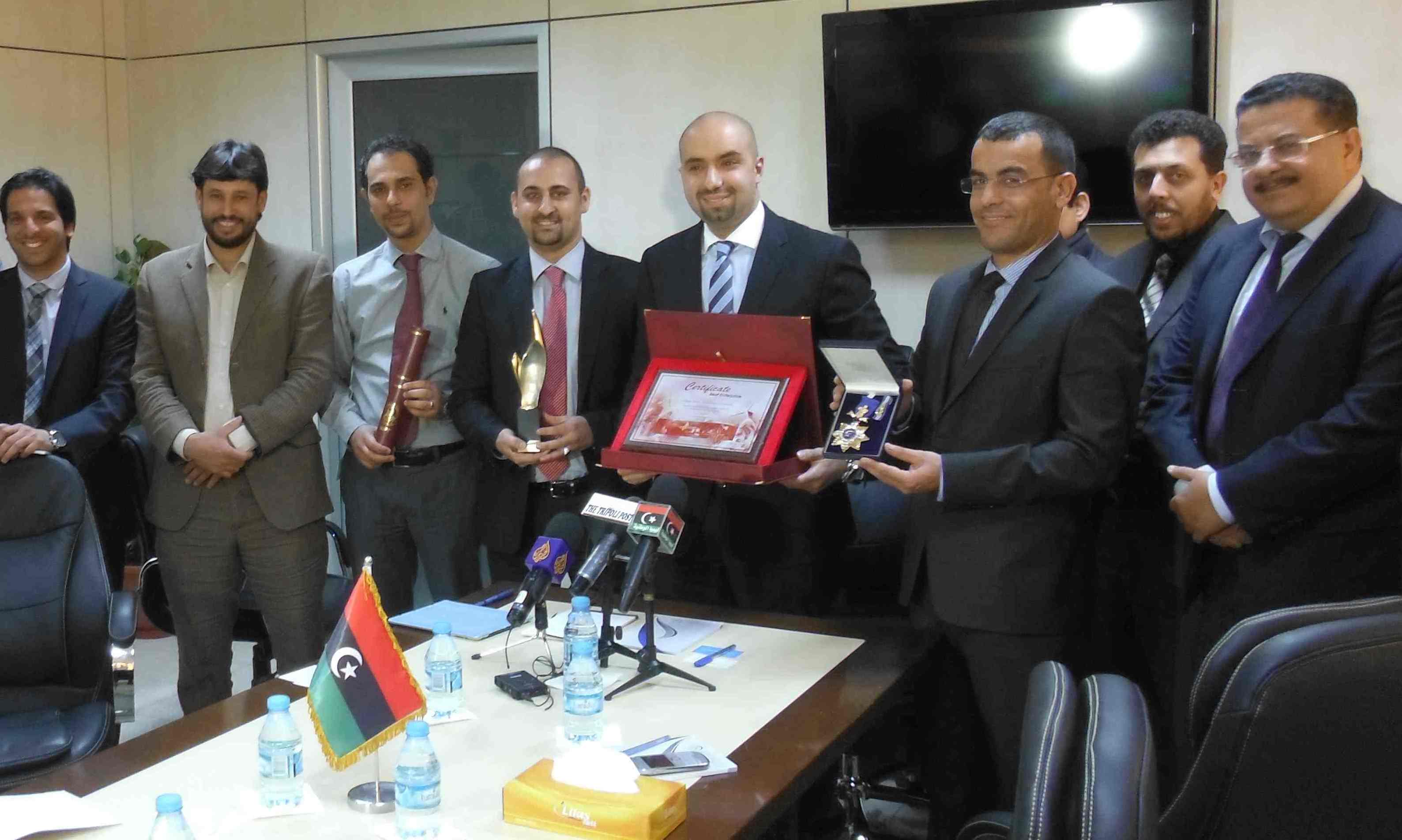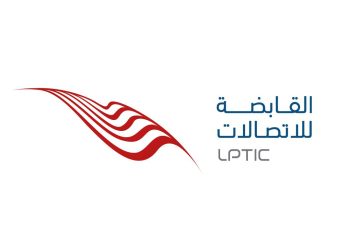By Nigel Ash

- Ahmed . . .[restrict]Kashadah with some of his LAIP team (photo: Nigel Ash)
Tripoli, 20 April 2013:
Ahmed Kashadah has an interesting memento of the organisational wreckage he and his team found when they moved into the headquarters of the Libyan African Investment Portfolio in Tripoli in September 2011.
The looted and damaged building has since been entirely repaired, save for a line of bullet holes across the wall that faces his desk, which he decided should be kept there, to remind him of the bureaucratic chaos he faced when given the task of tracking all $5 billion of LAIP’s assets.
“My first thoughts as I looked at the mess, ”he told the Libya Herald, “were how are we going to make any sense of this? It was a very worrying time, with late hours for all of us. Such was the pressure we were under, I lost 16 kilos in 65 days”.
The LAIP building had been shot up and looted, with even the CCTV cameras ripped out. A core of staff came back the day after the attack, to defend with the help of neighbours, what little was left in the the building. Much of the damage was criminal but said Kashadah there was evidence of some systematic pruning of the paper files – nothing was kept on computers. He remembered that sequentially numbered folders would suddenly have a gap and then continue. “Thieves would not have taken just one or two files” he said with a smile.
The task of establishing the nature and location of the full portfolio of assets was made the harder because some files had never actually existed in a recognisable form. One of Kashadah’s team explained: “Sometimes there were no appraisals, no business plans no due diligence at all. These were the projects where someone from the Qaddafi inner circle rang up and simply said that this was the deal that was going ahead and that payment should be made”. Moreover, explained Kashadah, not all the files were kept at LAIP’s headquarters.
The urgency in obtaining control of the fund’s assets arose in part from the need to ensure that they were not transferred and spirited away by members of the old regime and in part because LAIP’s parent, the Libyan Investment Authority (LIA) was regularly demanding results. One early success, said Kashadah, was the repossession through the courts, of a Botswana trading company that was controlled by members of the previous regime.
The job of work that Kashadah and his team managed in reassembling the portfolio was recognised in January this year. The UK’s Oxford-based European Business Assembly’s chose the LAIP managing director to receive a Socrates Award for Best Enterprise.
Some LAIP assets remain frozen by the EU, but Kashadah explained: “We want them to be frozen. There are some legal issues that need to be sorted out before we will ask for them to be unfrozen”. He declined to go into details, except to say that some assets were held through a network of four or five different companies, each of which had to instal new boards and this was what was taking the time.
With the greater part of LAIP’s portfolio back in place, Kashadah’s team has turned its attention to assessing and managing the assets, which he says are between 20 and 25 percent liquid. Around 60 percent of capital investments are in Africa, 15 percent in Libya and the rest mostly in Europe.
There still needs to be forensic accounting to examine past management of the assets and work out their future. For this said Kashadah, LAIP is working with PricewaterhouseCooper, Grant Thornton and KPMG on different parts of the portfolio with Deloitte advising on overall strategy.
“The most common problem with consultants and advisers, ” he explained, “is that you don’t know what it is that you want. We have this mess. We are now getting a clear idea of what we need. It is now that we are bringing them in”.
Kashadah was not prepared to speculate on the future shape of the portfolio. There had been two disposals of unprofitable assets, sales which were set up before the revolution; the offloading of LAIP’s stake in Sahel Bank for $200 million and the selling of half its 25 percent holding in Afriqiyah Airways to the government for LD 125 million.
Last year there had been speculation that Initial Public Offerings (IPOs) in both Afriqiyah and Libyan Airlines, as well as telcos Libyana and Al-Madar might well be used to wake up the slumbering stock market. “We didn’t think of an IPO for Afriqiyah,” said Kashadah, “It would have been too slow and it would have been more expensive.”
What is already clear from the analysis made by Kashadah and his people is that some of LAIP’s portfolio comprised gimcrack investments made to further Qaddafi’s political ambitions in Africa. Again declining to go into detail, he said that some non-performing assets had needed restructuring in order to save their capital. He indicated that this had been done successfully in at least one case, where it had been discovered the business had a negative equity of $200 million.
An early challenge for the new management was the nationalisation of LAIP’s controlling stake, held through subsidiary LAP GreeN, in Zamtel, Zambia’s leading telecoms company. LAIP bought 75 percent of Zamtel in June 2010 in an eight-cornered bid but last year Zambia’s new government re-nationalised the telco, saying the deal had been corrupt.
LAIP has rejected the accusations and is fighting through the courts for the return of its stake or compensation for an asset which it says is worth some $480 million. “The licence was for sale” said Kashadah. “We went through the paperwork. There was no wrongdoing. We don’t want to be linked to any corruption … if this was a bent deal, we would not want to be part of it, but it is not, as far as we know. What has happened is therefore not just”.
There are also plans, he said, to rework LAIP’s articles of association to make it clear that it is a fund for future generations, which will reinvest its earnings in its own portfolio. In 2009 $250 million was paid to the LIA. Kashadah said that if no disbursements were necessary, the fund could invest for the longer term, rather than having to maintain liquidity to pay out to the government when called upon. Whatever the final shape of the LAIP’s articles, the objective had to be clear and clean, he said.
During a Tripoli press call to show off his Socrates award, Kashadah made a point of surrounding himself with and generously praising the senior members of his turnaround team.
“Getting the right people was of critical importance” he said, “ When we started and after, sadly we had had to let some existing executives go, we had about 83 staff. We advertised for people with a range of skills and got around 3,000 CVs sent in. From those we took 60 good people, some of whom had to learn new skills on the job. With a few exceptions, these hirings have worked out well and we are still looking to recruit more of the right people”.
[/restrict]








